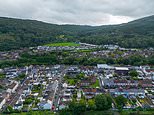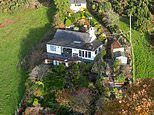
By Jose Ramos
Published: | Updated:
So-called ‘language extremists’ who won a fight to ban the names of the Brecon Beacons and Snowdonia now want to ditch Wales too – and have the country only known as Cymru.
More than 12,000 people signed a petition demanding the Welsh Government change the country’s name by abolishing the word ‘Wales’.
They argue the English name has been ‘imposed on Cymru’ and that by being known by its mother tongue would improve the country’s international standing.
The move follows Snowdonia officially becoming known as Eryri in 2022 and the Brecon Beacons national park rebranding itself as Bannau Brycheiniog the following year.
The national football team also now refers to itself in marketing and press as Cymru and nationalists are demanding the whole country follow suit.
More than 12,000 people signed a petition to change name of Wales to ‘Cymru’
The petition to change the name of Wales has had over 12,000 signatures
The move to change the name of the National Park last year came as its management claimed the association with a wood-burning, carbon-emitting blazing ‘beacon’ was ‘not a good look‘.
The campaign was backed by Welsh actor Michael Sheen but then Prime Minister, Rishi Sunak refused to use the Welsh name.
Now the petition to change the name of the country says that ‘hardly anyone’ has heard of Cymru and realises the country has its own culture.
The petition states: ‘Wales is a name imposed on Cymru and is essentially not a Welsh word at all.
‘The world knows about Wales because of its English connection since 1282.
‘Hardly anyone has heard of Cymru or realises that we have our own unique language and culture which is totally different from the other countries within the United Kingdom.’
However a counter petition deriding the move as a ‘pointless waste of taxpayers money’ has also been launched and gathered more than 5,000 signatures.
The Welsh Government discussed both petitions and said people could use either name they liked.
The move to switch the Brecon Beacons national park to Bannau Brycheiniog was derided by politicians – with former Prime Minister Rishi Sunak insisting he would still use the old name.
The Brecon Beacons National Park changed its name as a direct response to the climate crisis
He said: ‘When it comes to the Brecon Beacons, the first thing to say is this is an internationally renowned place to visit, attracts visitors from all around the world.
‘It’s something we’re all really proud of across the UK. I’m going to keep calling it the Brecon Beacons, and I would imagine most people will do that too.’
The rebranding campaign was coordinated by a Cardiff-based marketing agency, the co-owner and creative director of which
Creo was the agency responsible for a highly controversial rebrand of the Brecon Beacons National Park.
Its co-owner and creative director, Jordan Thorne, has used his X account (formerly Twitter) to share posts telling Margaret Thatcher to ‘burn in hell‘.
The campaign to change Brecon Beacons national park’s name was backed by Michael Sheen (pictured)
Other petitions from language extremists have also called for ‘Welsh names for Welsh places’ and axing English spellings of well-known tourist towns.
It would have meant Caerphilly cheese would become Caerffili Cheese and Barry Island would be Ynys y Barri.
The petition presented by linguist Mihangel ap Rhisiart said the move would show ‘respect for Wales as its own nation with its own history and culture; and as a mark of acknowledgement concerning some of the cultural oppression that has historically been inflicted on Wales and her language and culture’.
He added: ‘English names might initially continue to be used by some out of habit but in all official avenues and in both spoken and written media, the original Welsh names for places in Wales should be used’.
Former Welsh Language Minister Jeremy Miles said there was ‘a strong argument’ for using just the Welsh in some cases.
Speaking last year, he said: ‘We should aim for one spelling when there are only a few letters of difference between the Welsh and English versions’.






